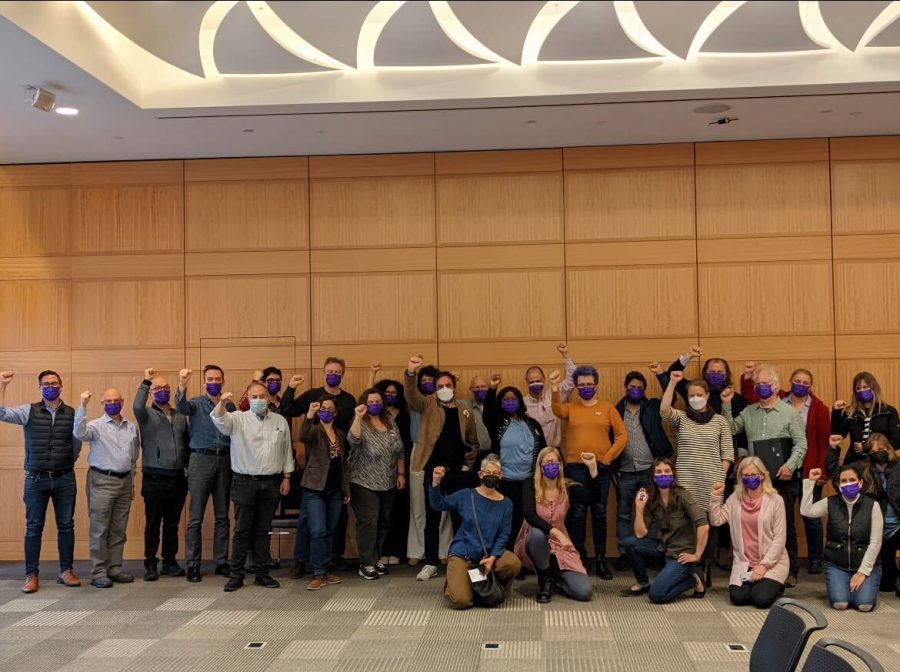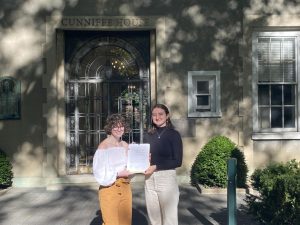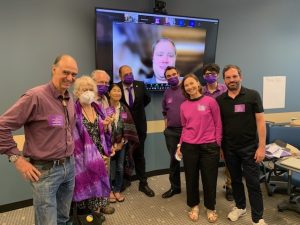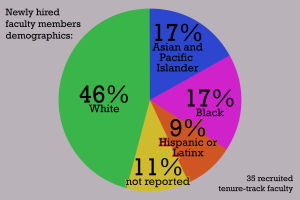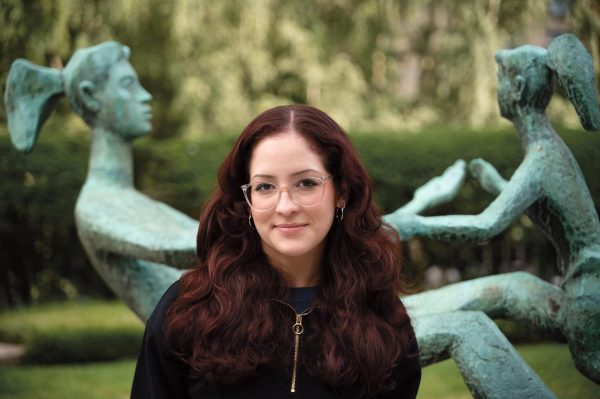Fordham Faculty Union Votes To Strike
FFU has been engaged in ongoing negotiations with the university since March 2022 to improve working conditions and benefits for adjunct instructors
COURTESY OF DIANE GEORGE
Fordham Faculty United experienced contentious contract negotiation sessions with the Fordham administration
January 18, 2023
UPDATE (Jan. 18, 2023): According to a tweet posted by FFU on their twitter account on Jan. 18, FFU and Fordham University have reached a tentative agreement (TA) regarding the union’s latest proposal. FFU has canceled the rally scheduled for Jan. 19 at 12 p.m. following the TA. Members have been advised to check their email in the coming days for more information on the TA and ratification vote.
Fordham Faculty United (FFU), the union representing nontenure-track professors at Fordham University, voted to authorize a strike effective Jan. 30 if the university’s administration does not agree to the union’s most recent contract proposal. In it, FFU is calling for increased wages, pay parity across the university’s different schools, and health benefits for adjunct faculty members. During the nine months of negotiations, both parties have been unable to come to an agreement. As a result, approximately 90% of the union’s members who participated in the vote favored the strike.
According to Diane George, recently elected co-chair of FFU and an adjunct professor of anthropology at Fordham College at Lincoln Center (FCLC), students should expect all classes that are taught by the over 600 FFU members to be canceled on Jan. 30 “unless and until the university offers us a fair contract.”
“That means there will be no online classes, no asynchronous, no take-home assignments,” George said. “Professors will not respond to students’ emails about academic issues.”
“If the strike were to continue for an extended period, it’s the university’s job to ensure that students graduate.” FFU Student FAQ
Faculty members will form a picket line outside the university and protest beginning on Jan. 30, lasting until the university offers the FFU “acceptable terms,” according to a student FAQ organized by FFU. Students will not be responsible for assignments and won’t receive grades for classes taught by FFU members.
“Once the strike is over, we will all return to work, and the semester will proceed normally. We don’t expect the strike to affect anyone’s graduation since it is early in the semester,” the FAQ created for students read. “If the strike were to continue for an extended period, it’s the university’s job to ensure that students graduate.”
On the first day of classes for the spring semester, Jan. 17, Dennis C. Jacobs, provost and senior vice president for Academic Affairs, released an email to the Fordham Community warning that the strike authorization vote “does not necessarily mean there will be a strike,” and that negotiations are continuing in hope of an agreement.
“We will be communicating with the community again as our negotiations progress,” Jacobs said.
FFU has expressed agreement with the provost in a Jan. 18 Instagram post, noting that “there does not need to be a strike if the administration offers us a fair agreement,” and that FFU remains “hopeful” that an agreement is possible.
Later that day, Jeffrey L. Gray, senior vice president of student affairs, released a statement to Fordham parents and families notifying them of the potential strike and ongoing negotiations. According to Gray, university operations will continue, but the strike will delay coursework, causing Fordham to “make up those missing classes.”
Gray also expressed that the university is not disclosing details of the negotiations in order to “maintain trust with the adjuncts and their union leaders.”
“We share your frustration at the current level of uncertainty, but rest assured the University is thinking of every contingency,” Gray wrote.
FFU has expressed agreement with the provost in a Jan. 18 Instagram post, noting that “there does not need to be a strike if the administration offers us a fair agreement,” and that FFU remains “hopeful” that an agreement is possible.
FFU’s Demands to Fordham University
Currently, adjunct faculty members with zero to three years of experience at the College of Arts and Sciences (CAS) are paid a minimum of $7,000 per three to four-credit course. At the Graduate School of Social Service (GSSS), adjuncts receive $4,900, and at the Graduate School of Religion and Religious Education (GSRRE), they make $4,600 per course. Additionally, adjunct faculty members are limited to teaching a maximum of two courses per semester at the university.
In its most recent proposal from Sept. 29, 2022, the union pushed to raise these pay rates and decrease the pay disparity among adjunct faculty members across different schools. Under this proposal, adjunct professors with zero to three years of experience at CAS will gain a $1,500 gradual increase in pay per course by the 2024-25 academic year, and adjuncts at GSSS and GSRRE will see a gradual $2,000 increase within the same time frame.
According to an infographic posted on FFU’s Instagram account, the proposition to increase pay parity is due to “adjunct professors working in different Fordham schools getting paid $1,600 to $3,400 less per course for the same work.”
The university later presented a new proposal in November 2022 after the union announced a strike petition to gauge interest in a strike authorization vote. The university’s proposal included a $1,200 gradual increase for adjunct professors with zero to three years of experience at CAS by 2024-2025, a $1,700 increase within the same time frame for adjuncts at GSRRE, and an increase of $1,400 for those at GSSS. The university’s offer was $300 less than the union’s proposition for adjunct professors at CAS and GSRRE and $600 less for adjuncts at GSSS.
According to information compiled by FFU, the union has decreased their average proposed pay per course over the course of the negotiations for adjunct faculty members at CAS by 15.2%, 39.3% for those at GSSS, and 43.4% for those at GSRRE. Since its November 2022 proposal, the university has increased the average proposed pay per course by 6.9% for adjunct faculty members at CAS and 8% for those at both GSSS and GSRRE.
“We made clear that we have compromised continuously, and we can’t go any lower,” George said. “And the reality is that we don’t know our members will approve a contract if we go any lower.” Diane George, co-chair of FFU
George said that although the university’s proposal has yet to meet the union’s compensation demands, even as they have lowered, it is indicative of movement between both parties.
“We made clear that we have compromised continuously, and we can’t go any lower,” George said. “And the reality is that we don’t know our members will approve a contract if we go any lower.”
Melanie Knuts, an adjunct professor at GSSS and FFU member since 2018, stressed the degree of commitment her students and adjunct field advisers at GSSS have while engaging in fieldwork with communities across the New York metropolitan area. Knuts added that her experience with Fordham students and faculty members has made her disheartened by the negotiations.
“I have never before in all the places I have taught been surrounded with students who have the kind of work ethic, the kind of dedication and the kind of inner desire to be of service,” she said. “Fordham is a place that attracts people who are extraordinarily dedicated and want to be of service. It’s an honor to be affiliated with Fordham and at the same time, this is the reason it’s been devastating for me to be on this side of the negotiating.”
Knuts compared her experience teaching as an adjunct associate professor at New York University (NYU) throughout the 1990s and noted that despite “woefully low” pay, the university had no compensation disparities among schools, and contingent faculty were “welcomed as members whose expertise in the community enriched the education of students.”
FFU leadership and the university met with a mediator again on Jan. 13, where George says that both parties continued to discuss compensation.
For Knuts, being paid less per course at GSSS feels “demeaning and humiliating.”
“Ninety percent of my students are women at GSSS as are a vast majority of all contingent and non-contingent faculty and administration at GSSS,” Knuts said. “This significant pay disparity under these circumstances could easily be understood as sexism.”
On Dec. 8, FFU and Fordham met with a federal mediator to aid negotiations but were unable to arrive at an agreement.
FFU leadership and the university met with a mediator again on Jan. 13, where George says that both parties continued to discuss compensation. Bob Howe, associate vice president for communications and special adviser to the president, called the meeting productive.
According to George, the Jan. 13 meeting also included discussions around a Flexible Spending Account as a form of a health benefit. Currently, adjunct and contingent faculty members are not eligible for health insurance plans that include contributions from the university like tenure-track faculty members are.
“If they really compensated us for what we were worth, they’d help us take care of ourselves, and we’d be able to give so much more.” iane George, co-chair of FFU
Adjunct faculty members may choose to register in a health insurance policy administered by UnitedHealthcare without any contributions from Fordham. According to forms made available under Fordham’s Office of Faculty Affairs page, single medical coverage under the plan costs $1,120.45 monthly, and family medical coverage costs $2,913.17.
“I have many, many female colleagues in a primarily female field who are not married and shouldn’t have to depend on being married to have health care and or to have secondary health care,” Knuts said. “I’m one divorce away from it affecting me personally as any other married woman.”
George emphasized that when it comes to providing health benefits to all faculty members, professors’ well-being and commitment toward coursework are directly related.
“If they really compensated us for what we were worth, they’d help us take care of ourselves, and we’d be able to give so much more,” she said.
Olivia Wood, an adjunct professor of English at Fordham and full-time professor at City College, said that she needs to see a mental health specialist outside of her health insurance network, even with health insurance provided by CUNY.
Since launching a strike petition in November 2022, FFU has garnered letters of support addressed to University President Tania Tetlow, J.D., from tenure-track faculty members in nine different departments, the GSRRE and Fordham’s theater program.
“I’m always out of network which means that’s quite a high monthly bill,” Wood said. “And that’s one of the reasons insurance is so important and really high-quality insurance.”
Professors who rely on health insurance from the marketplace are subject to premiums costing upward of hundreds of dollars.
“That makes real pay way lower than what it actually is, and if having Fordham insurance brought that down by just half … way better insurance for half the cost could be life-changing,” Wood said.
Since launching a strike petition in November 2022, FFU has garnered letters of support addressed to University President Tania Tetlow, J.D., from tenure-track faculty members in nine different departments, the GSRRE and Fordham’s theater program.
In a letter from the department of art history and music from Dec. 20, faculty members articulated the department’s dependence on nontenure-track faculty members, like many other departments at Fordham. According to the letter, from fall 2020 to spring 2022, between 59% to 80% of the department’s introductory classes were taught by nontenure-track faculty members.
In response to the negotiations and the strike authorization, Howe noted that the university hopes to “reach an agreement with the union that would increase their compensation without creating an undue tuition burden for students.”
“We applaud the University’s significant investment in student support—one example of this being the newly created Advising Center—but we fail to understand why the University cannot make a similar financial commitment to supporting unionized faculty,” the letter read.
FFU has also gained support from elected officials, including New York State Reps. Jamaal Bowman, Jerry Nadler and Ritchie Torres; New York State Assemblymember Linda Rosenthal; Chairwoman of Westchester Board of Legislators Catherine Borgia; Westchester County Executive George Latimer; New York State Sen. Shelley Mayer; and Manhattan Borough President Mark Levine.
Fordham and Union Members React to Possible Strike
In response to the negotiations and the strike authorization, Howe noted that the university hopes to “reach an agreement with the union that would increase their compensation without creating an undue tuition burden for students.”
“The university’s last offer remains on the table: SEIU has not made a formal counteroffer, though negotiations continue,” Howe said.
In an email sent to university faculty members on Nov. 18, Tetlow said that the university is working hard to make a difficult situation better, but that higher education in the U.S. has become increasingly divided.
Tetlow added that Fordham has “no choice but to function in that academic marketplace” and noted that Fordham cannot compete with compensation at other neighboring universities such as Columbia University or NYU.
“Universities invested in research by gradually reducing the teaching load of tenure track faculty,” Tetlow said. “As a result, none but the wealthiest schools could then afford to hire enough tenure track faculty to cover the curriculum with reduced teaching loads.”
Tetlow added that Fordham has “no choice but to function in that academic marketplace” and noted that Fordham cannot compete with compensation at other neighboring universities such as Columbia University or NYU.
George believes that salaries do not necessarily derive from tuition.
“They have a lot of money, it’s a matter of budgeting and priority,” she said of the university. In an annotated version of the email, FFU stated that they are not demanding wages that match these schools, but “are asking that Fordham keep up.”
“Under the union’s proposal, minimum pay for adjuncts in arts and sciences would still be $4k less per class at Barnard, and $2.9k less per class than at NYU,” the union noted.
“They can stop (the strike) if they want to offer us a fair contract before Jan. 30, they can stop that at any time,” George said. “We are still cooperating with negotiations.”
FFU and union members are encouraging students to advocate for professors’ better working conditions and join the picket line.
Amid contract negotiations at other universities and recently ratified contracts at NYU after a strike authorization and a three-week strike at The New School, unions are expressing solidarity with one another.
Nontenure-track faculty unions across New York City have organized a no-scab pledge in support of ongoing negotiations at universities like Fordham. Adjunct professors who have signed the pledge will not accept a position to potentially teach the course of a professor currently striking.
FFU and union members are encouraging students to advocate for professors’ better working conditions and join the picket line.
“When we talk to members who are nervous about striking, the biggest concern that comes up is, but I want to make sure that students are protected,” Wood said. “And so the best way to reassure these people is to have showings of student support.”
FFU has organized teach-in sessions on Jan. 18 “to understand better the realities of labor and organizing, and recent higher education strikes, including the Fordham Faculty United strike.”
The union will rally on Jan. 19 at noon to pressure the administration into meeting its contract proposal at the Lincoln Center campus. The Observer will publish an article in the days following the rally.”
Fordham University’s Office of Legal Counsel, which is involved with contract negotiations between the union and the university, has not responded to The Observer’s request for comment at the time of publication.

